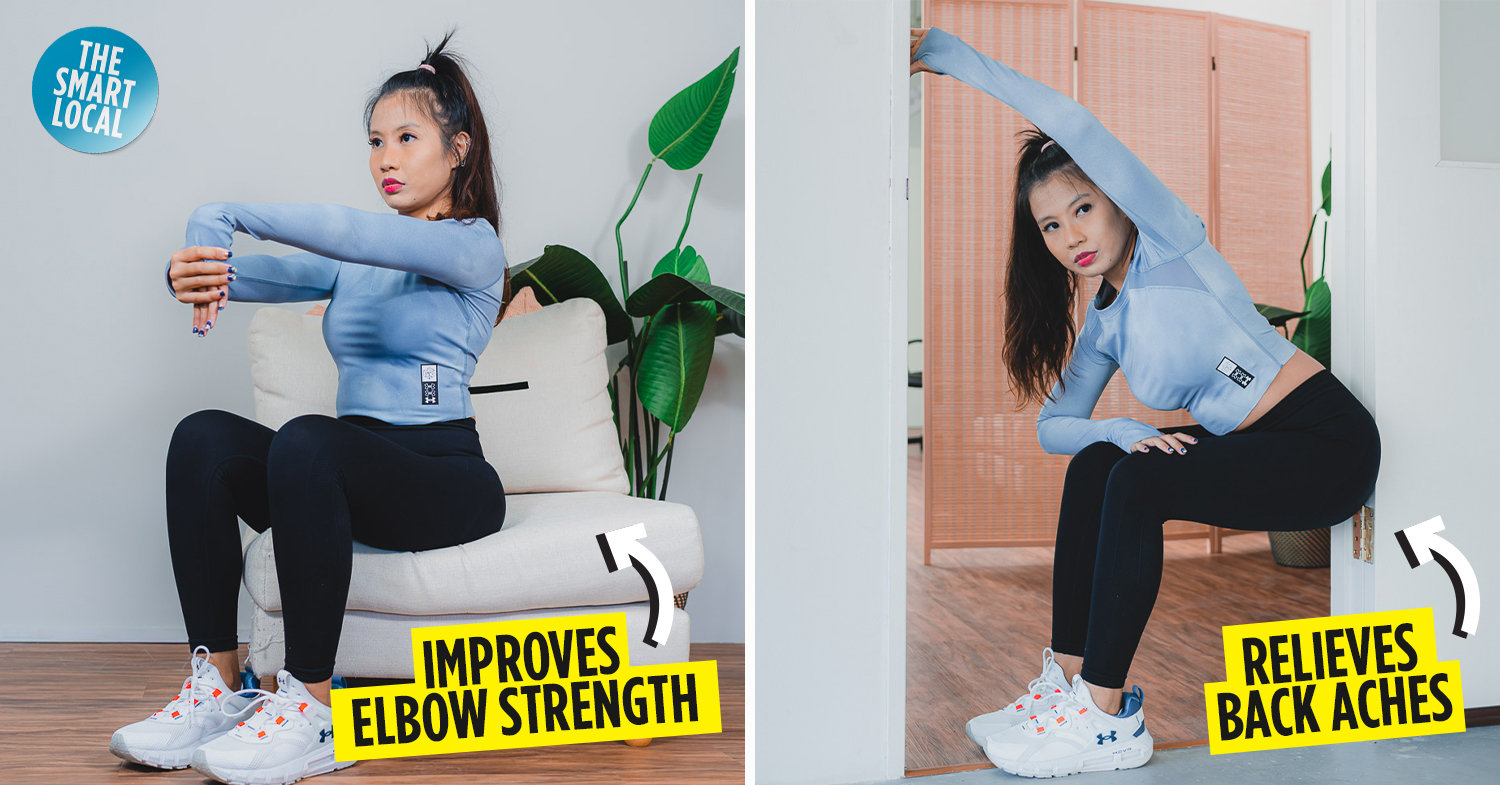Easy exercises and stretches
Ever since WFH became a thing, most of us have turned the dining table, couch and even bed into our default workstation. And although that might sound comfy, we end up having an aching back, a tight neck and stiff shoulders due to our poor posture.
To alleviate the body aches, there are a few things you can do: invest in a proper ergonomic chair, sit up straight and give yourself a good stretch every 2 hours. To get you started, here are 8 easy exercises and stretches you can do while hitting your KPIs.
1. The standing leg tuck
When you spend hours slouching over the computers or standing on your feet, don’t be surprised if a random bout of piercing pain comes knocking at your back. To relieve some lower back tension, think about doing a few reps of the standing leg tuck.
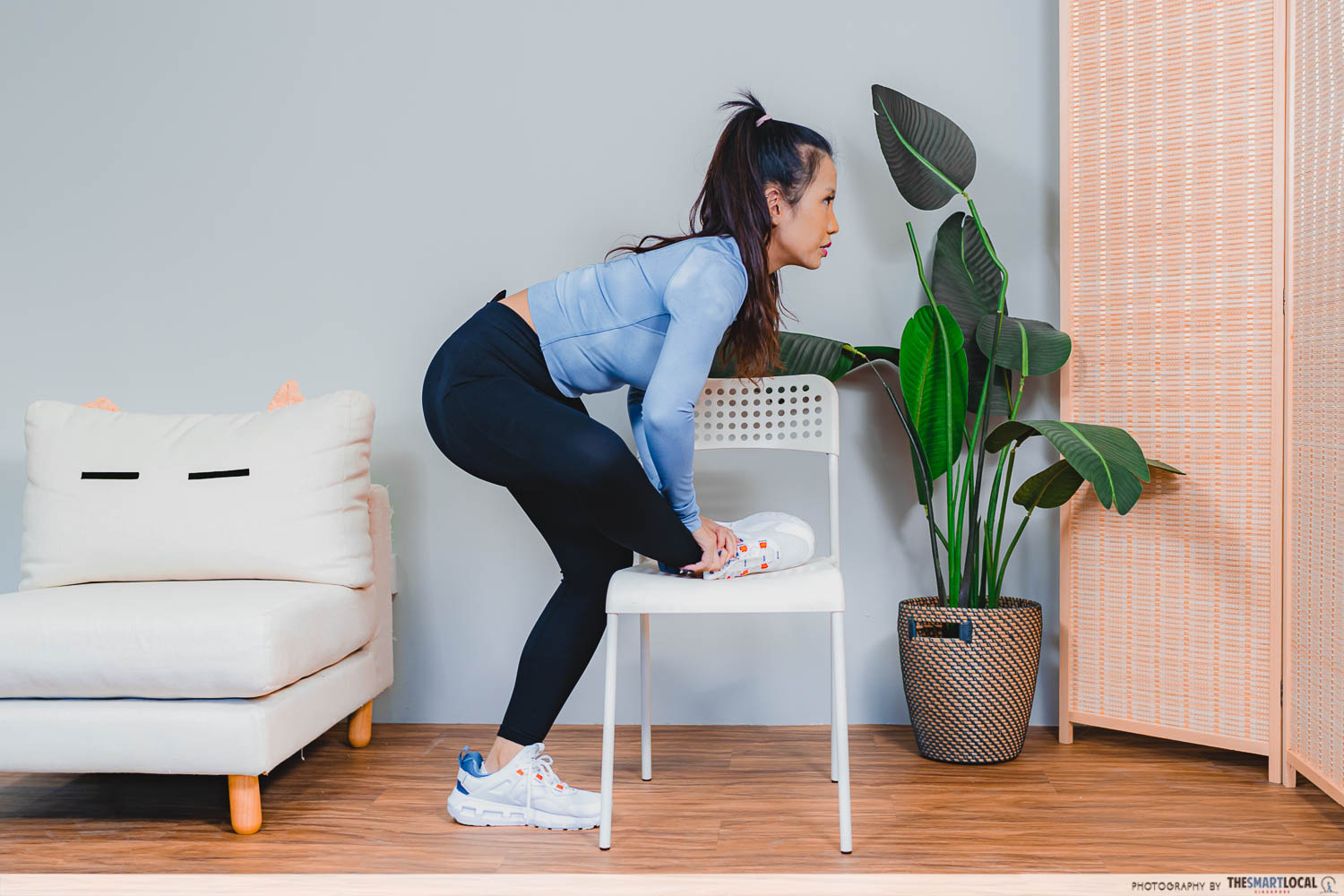 Steps:
Steps:
- Put one foot on a chair and gently fold over with your chest leaning forward.
- Hold the stretch for 20 seconds and switch to the other leg.
- Repeat 3 times on each side.
You should be able to feel it on your glutes, thighs and legs.
The standing leg tuck can easily be done at home, at the office or right at the cafe that you’re working from – if you don’t mind people staring at you.
2. The sitting rotation
For those who’d like to stay seated while still being able to squeeze in a solid stretch, opt for the sitting rotation.
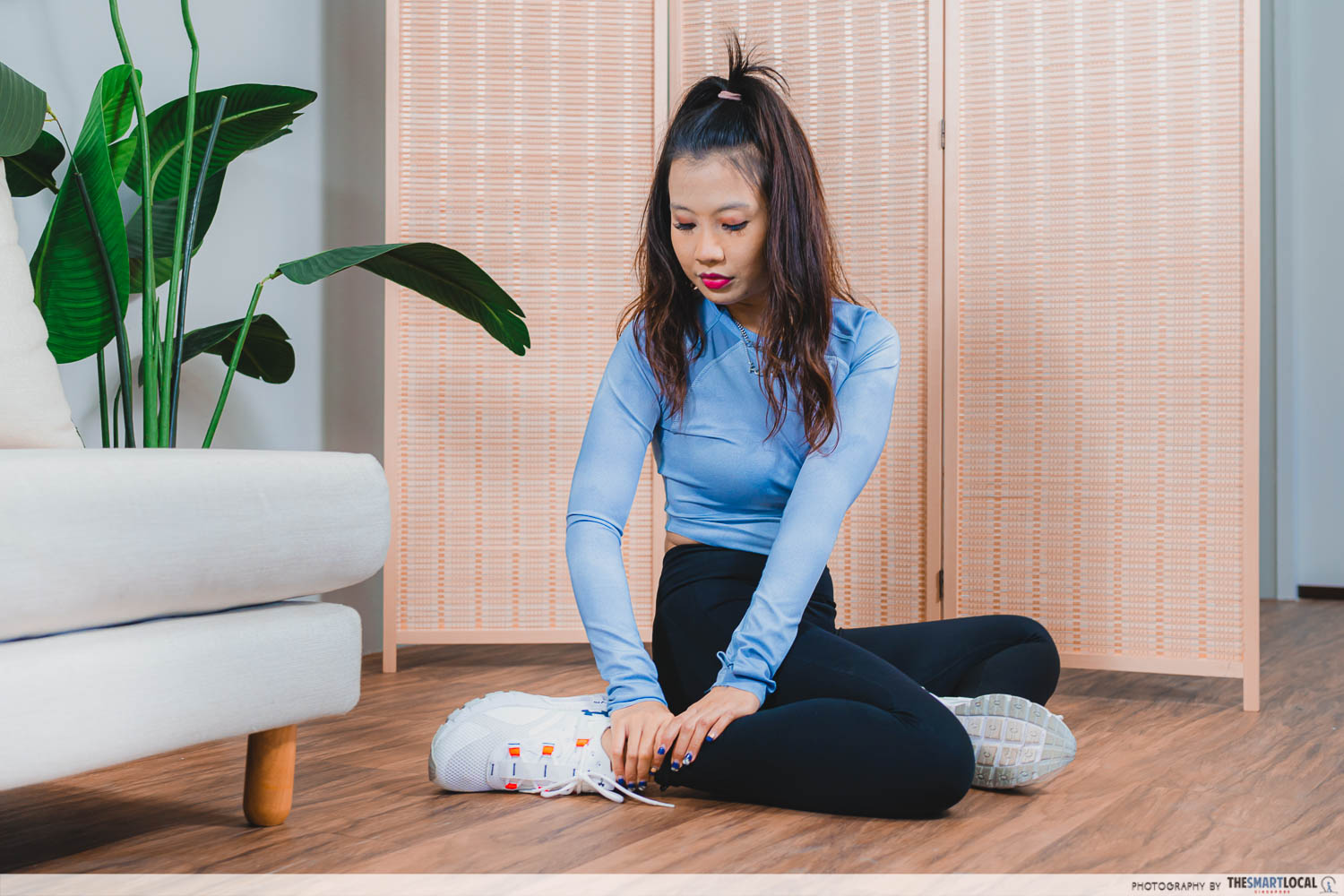 Steps:
Steps:
- Sit down on the floor with one leg folded in front of you and the other leg behind.
- With your chest lifted, gently turn your body towards the hind leg.
- Hold the pose for 20 seconds and switch legs.
Repeat a few times as needed. When you do the stretch correctly, you’ll feel it in your glutes and upper thighs.
3. The single-leg chair squat
If you’ve ever experienced knee pain, then you know the last thing you’d want to do is exercise. However, being inactive might worsen the problem. But if you don’t have time to go for a swim or a walk, consider doing some easy knee exercises like the single-leg chair squat.
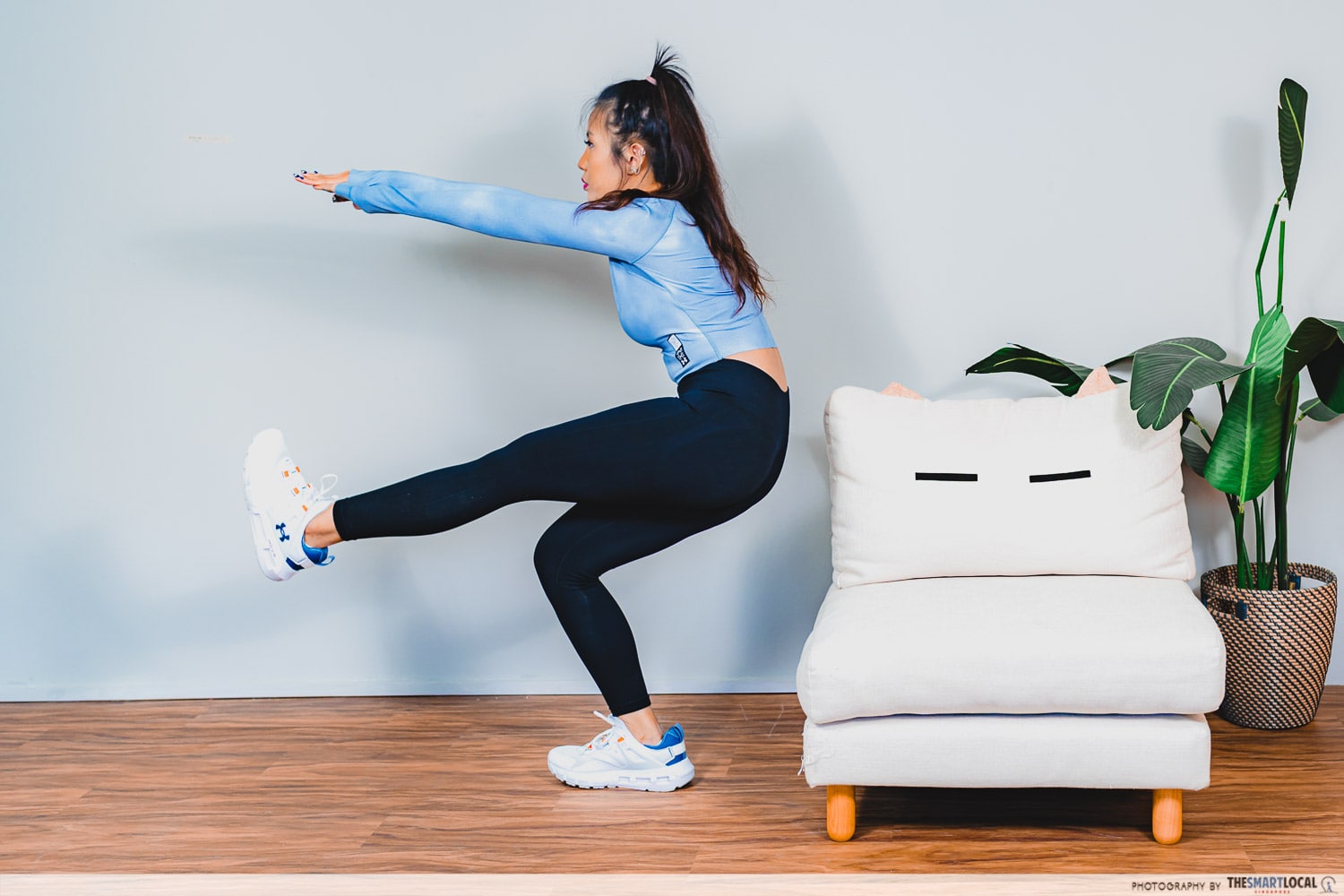 Steps:
Steps:
- Place a chair behind you and standing on the right foot.
- Extend your left leg to create a 45-degree angle and slowly lower your body onto the chair.
- Push your body back up.
- Repeat 10 times on each side.
Most of your body weight should be on the standing leg. Use your heel to balance and keep your knee steady.
This simple single-leg squat is suitable for people of all ages and can help to improve knee joint stability and leg strength.
4. The wall downwards half-dog
Yoga poses and any variations of them – like the wall downward half-dog – carry a myriad of benefits such as releasing lower back tension and relaxing neck and shoulders stiffness.
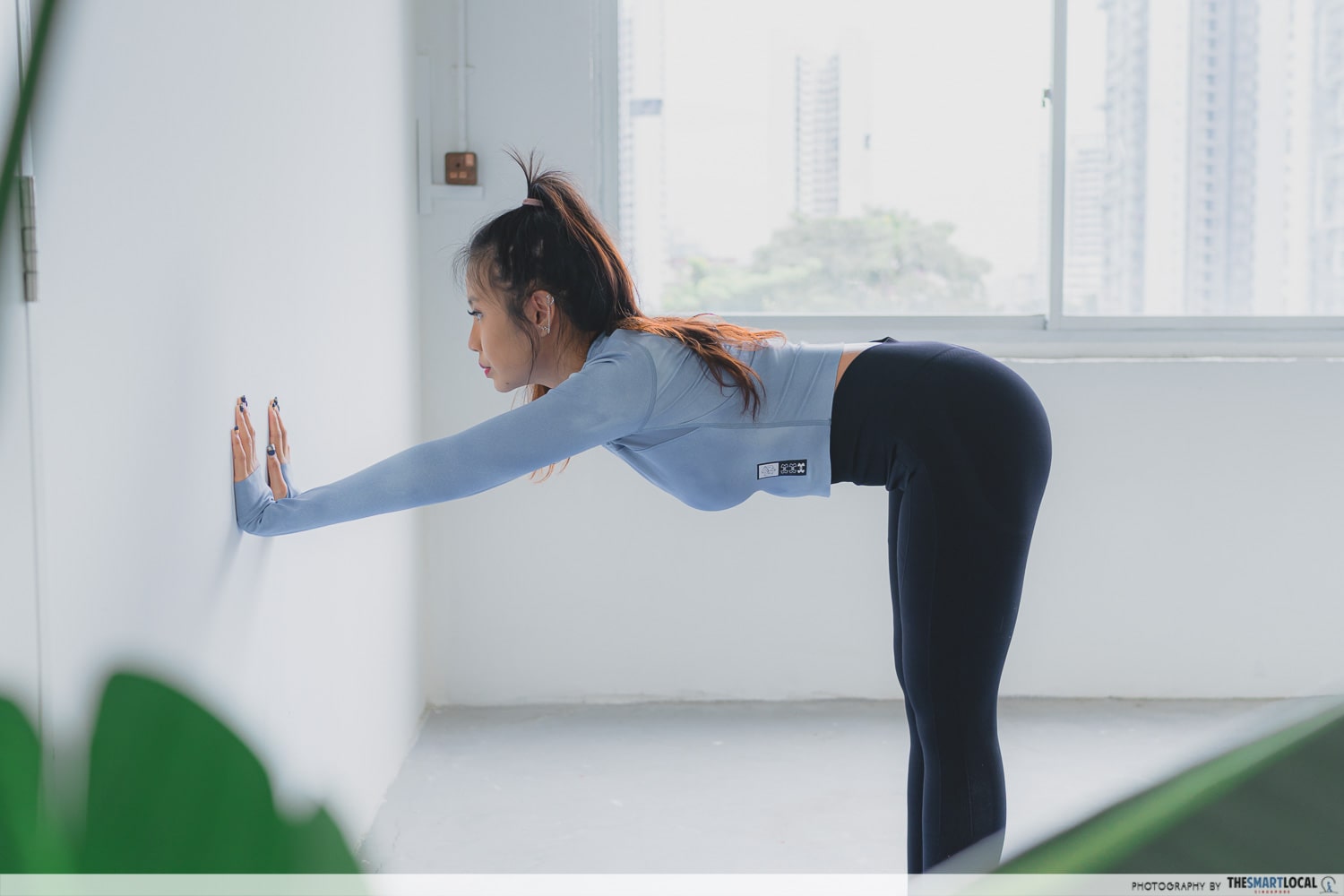 Steps:
Steps:
- Place your hands on the wall and stand about an arm’s length away.
- Lower your head in between your arms while pressing your hands against the wall.
- Keep your back straight and hold for 20 seconds.
Unlike the traditional downward dog pose, a wall half-dog puts less weight onto your arms and wrists. It also allows you to lengthen your lower back and stretch your hips at the same time.
5. The doorway backstretch
Another potent exercise for those who’ve been plagued with lower back pain is the doorway backstretch.
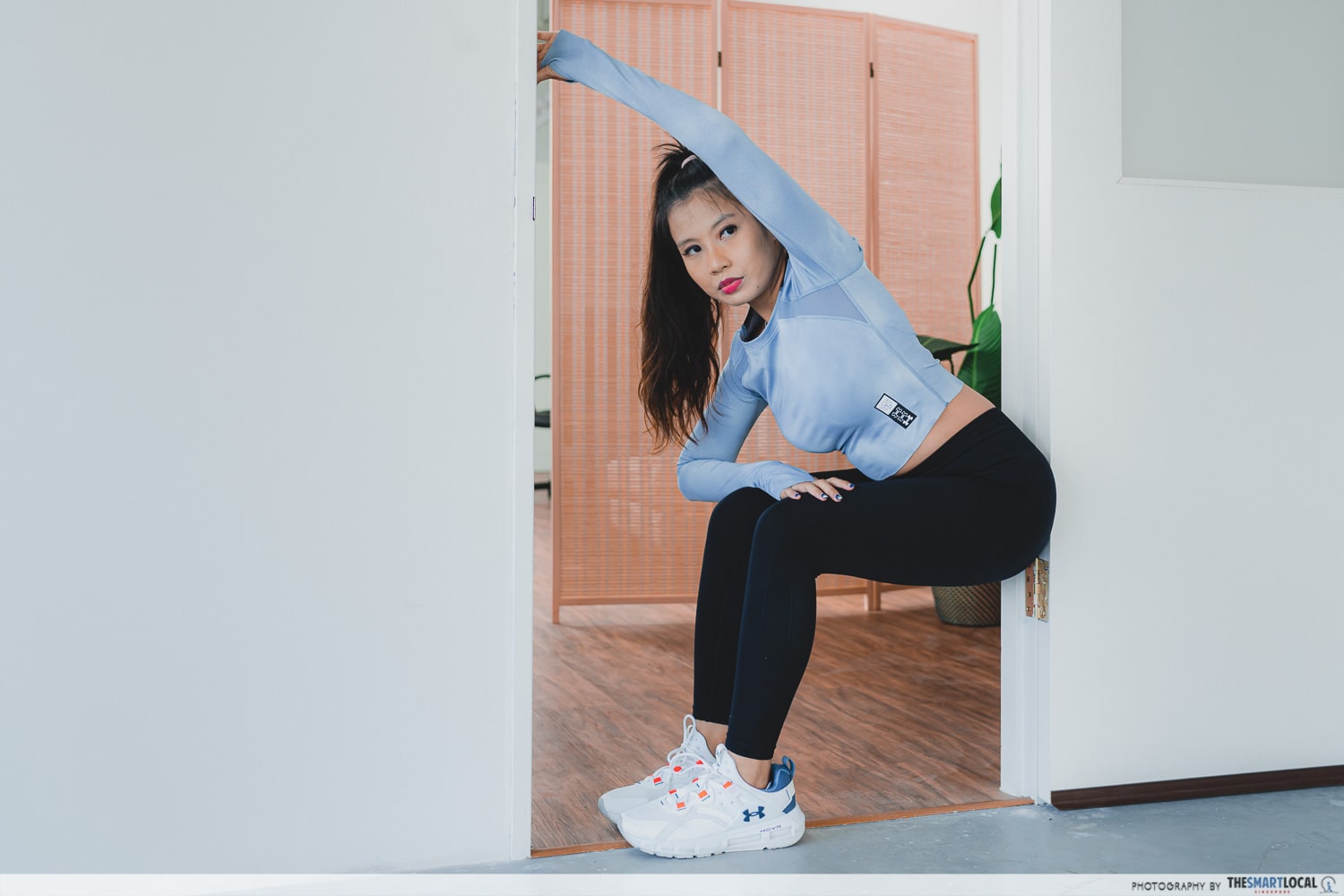 Steps:
Steps:
- Grab onto either the outside or inside of the doorway with your left hand and step back until you’re an arm’s length away from the wall.
- With your knees slightly bent, lower your upper body and gently twist towards the left-hand side.
- Put your right hand onto your left knee and hold the stretch for 15 seconds.
- Repeat the routine on the right-hand side.
Do this right and you should be able to feel the stretch in your glutes and back of your thighs.
6. The elbow extensor stretch
Elbow pain often occurs in either fitspos who lift heavy or the elderly. But if you belong to neither of those categories and find yourself with an aching arm joint, keep calm and try a quick fix like the elbow extensor stretch.
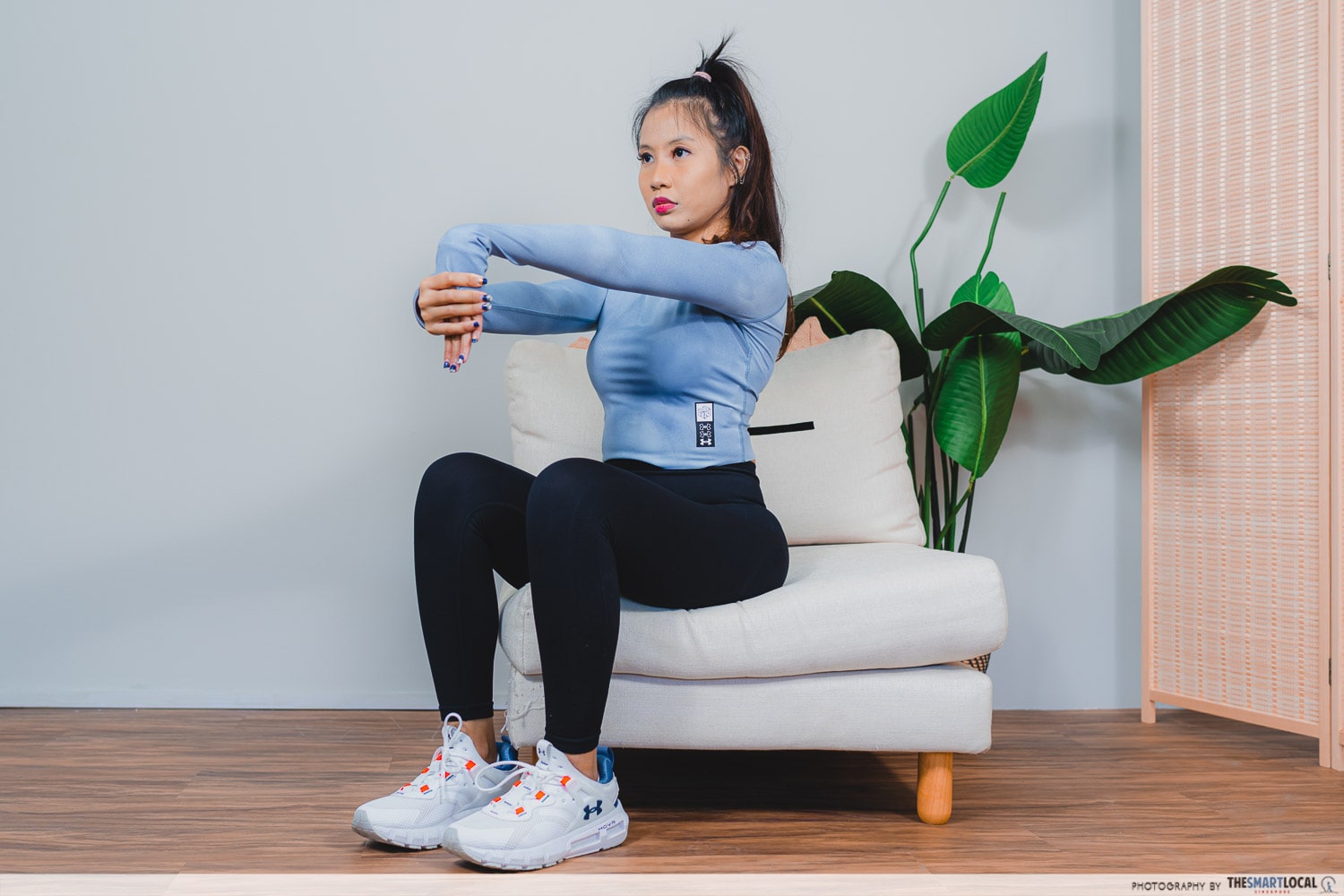 Steps:
Steps:
- Extend your arm and bend your wrist downwards.
- Use the other arm to gently pull the stretching hand back towards your body and twist your wrist outwards.
- Hold for 20 seconds and repeat 5 times on both sides.
To maximise your chance of recovering at home, try to rest your elbows as much as possible and use a strap when you’re out and about. If the pain persists for more than a month, see a doctor to make sure there are no serious injuries like elbow fracture or dislocation.
7. The scorpion stretch
Effective animal-related moves that help to strengthen your muscles don’t just stop at the bear plank and the crab crawl. There’s also the scorpion stretch that can give your hips, lower back and hamstring a break while increasing their mobility.
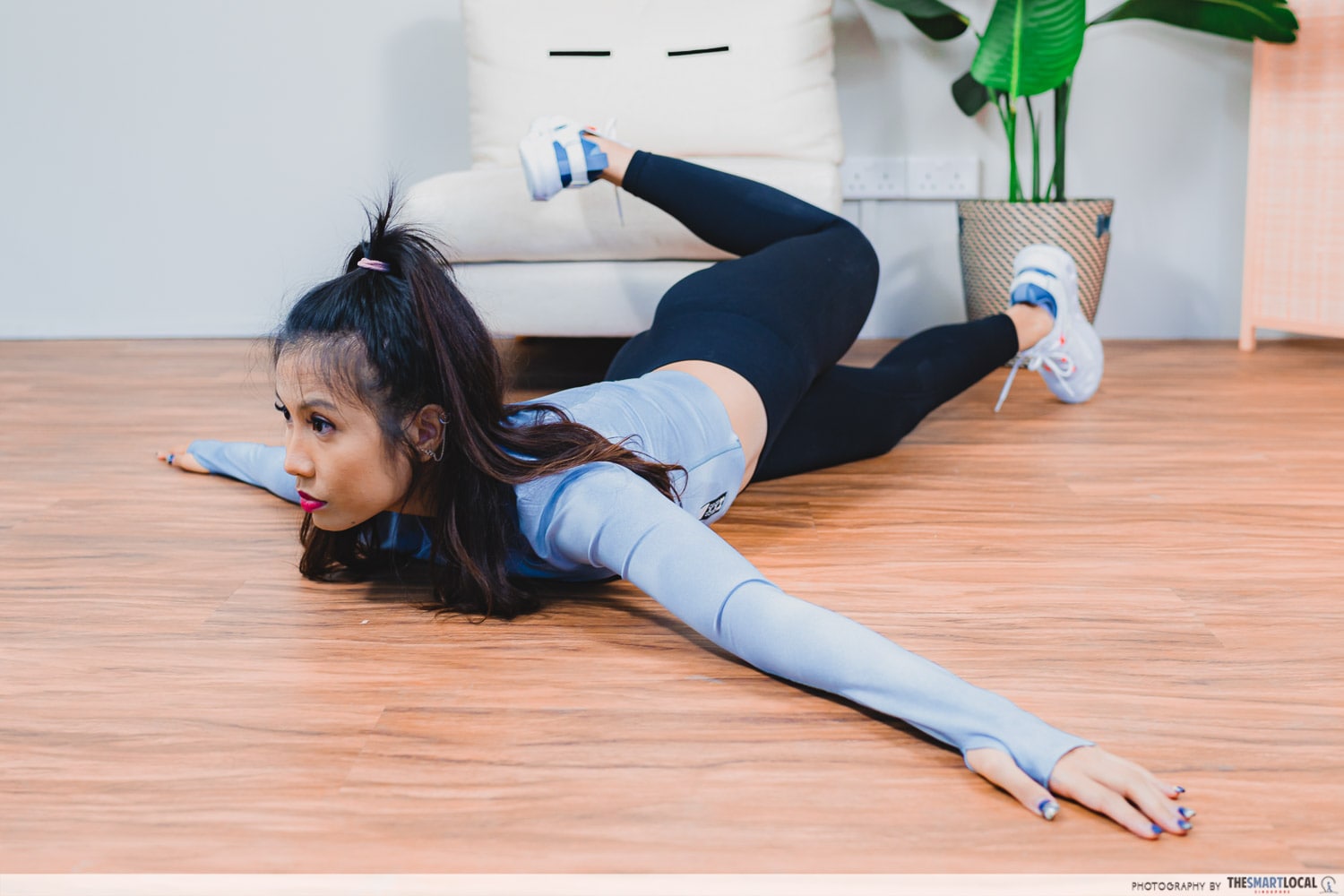 Steps:
Steps:
- Lay flat on your chest and extend both arms to the side to create a T-shape.
- Slowly lift one leg and move it to the opposite side. Your hips can twist with the motion but make sure your body doesn’t roll over. Depending on how flexible you are, you might be able to touch the floor with your foot.
- Hold for 15 seconds and repeat on the other side.
Those with hips, lower back and hamstring tightness will feel a satisfying release instantly. But if you’re experiencing neither, channel a scorpion anyway because it can warm your body muscles up for any intensive exercises you’ll be doing – like HIIT or spin.
8. The arm circles
When it comes to body aches, desk workers have 99 problems and unfortunately, they don’t stop at just the lower parts of the body. Shoulder pain and upper backache also hit hard and leave you wincing when you spend 10 hours hunched over a computer screen. If that’s the case, try these simple arm circles.
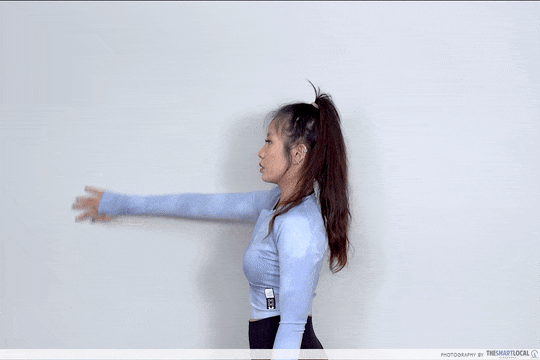 Steps:
Steps:
- Stand next to the wall and extending the inner arm in front of your body.
- Make big and slow circles rotating from your shoulder joints without touching the wall.
- Repeat 10 times in both clockwise and counterclockwise directions before turning to face the other side and rotating the other arm.
One thing to keep in mind throughout the exercise is to keep your core engaged and your feet grounded. That way, you can focus the entire movement on easing your shoulder, upper back and even chest pain.
Relieve body aches with easy stretches & exercises
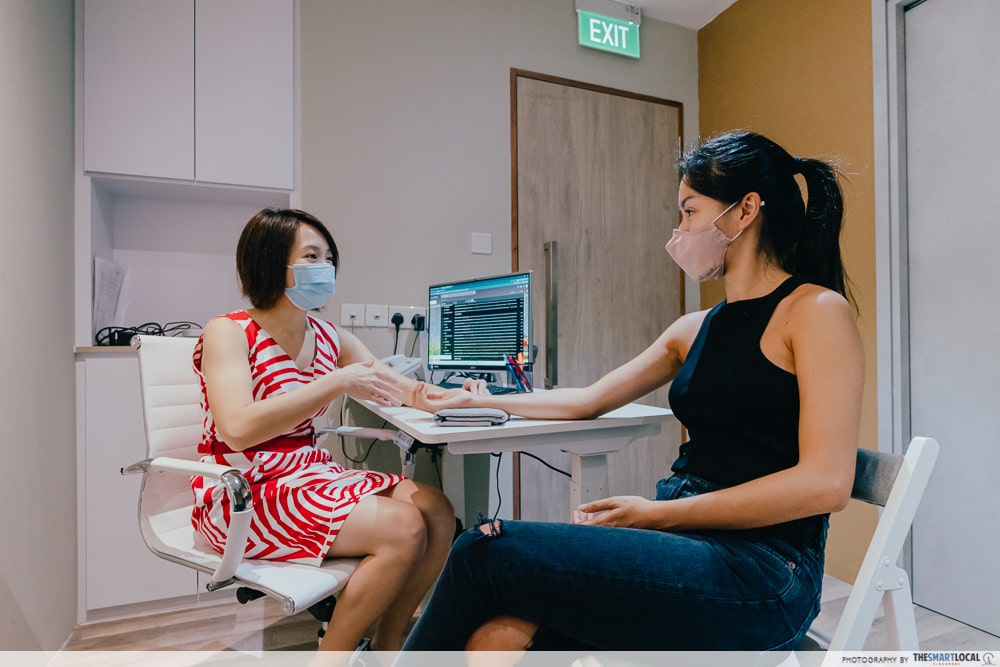
In the age of trendy gyms and influencer-fueled fitness apps, easy home stretches and exercises still come in handy – especially when you’re neck deep in work obligations and family duties. But if the aches and pains don’t seem to go away after several series of deep stretches, it’s time to bring out the big gun and hit up Singapore Paincare TCM Wellness Clinic.
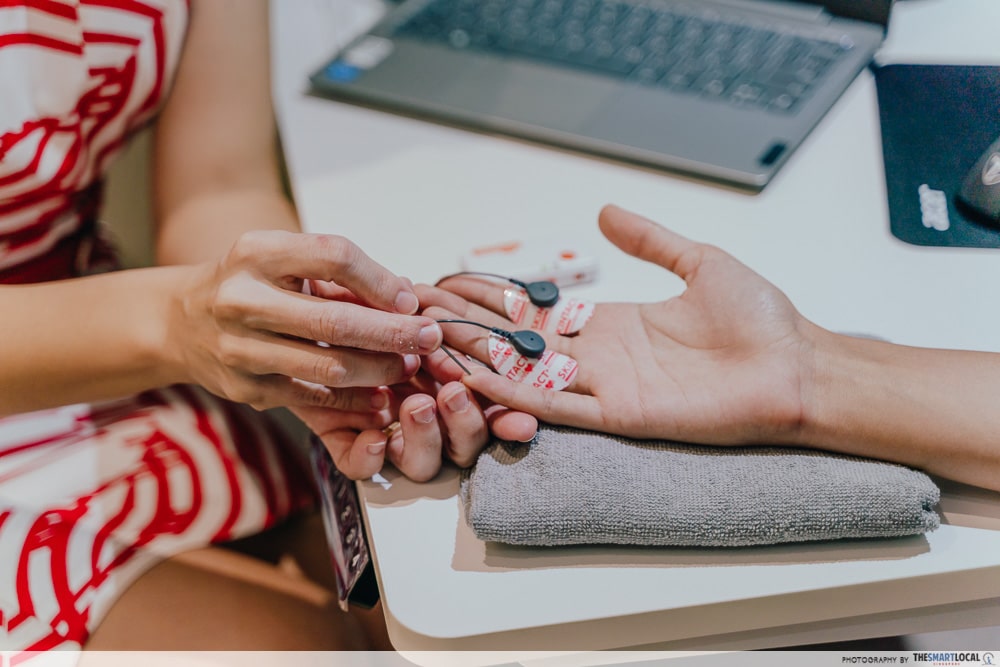 The Skin Conductance Response test is used to measure a patient’s pain level.
The Skin Conductance Response test is used to measure a patient’s pain level.
Here, you’ll be able to find a slew of customised treatments catered to people who suffer from a wide range of aches and pain such as acute neck pain, chronic migraine and backache. Every regime includes 5 steps: a pain assessment to measure your pain level, followed by a consultation, prescribed TCM treatments and physical therapy.
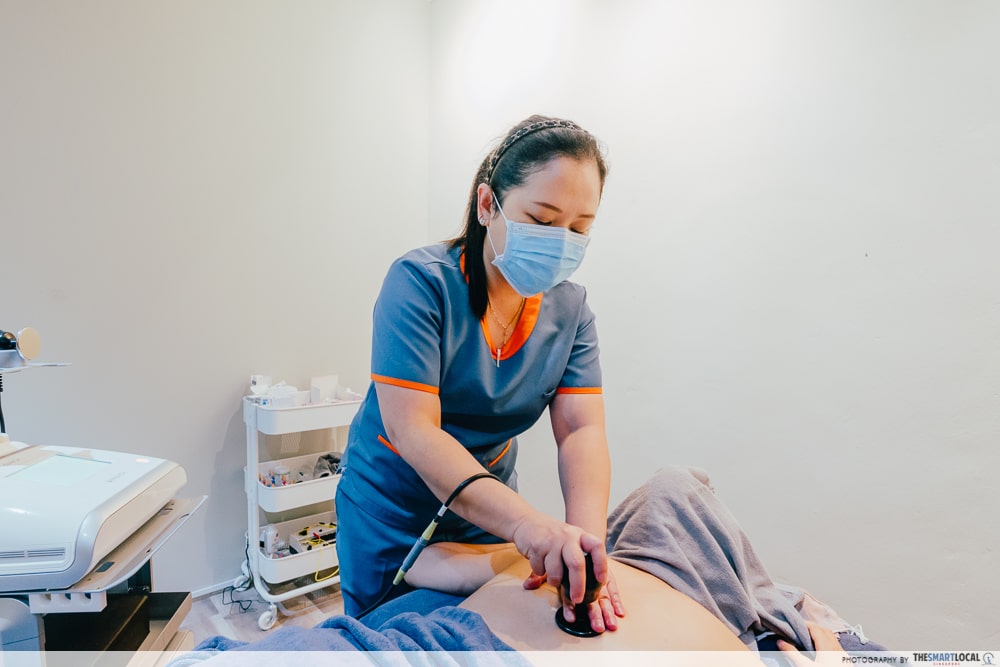 The signature Qi’Nergy Tuina massage combines Chinese and Western techniques.
The signature Qi’Nergy Tuina massage combines Chinese and Western techniques.
Unlike other TCM clinics, Singapore Paincare TCM Wellness crafts regimens using both the Chinese and Western medical approaches. The Qi’Nergy Tuina massage, for instance, combines traditional tuina and meridian acupoints with myofascial release and radiofrequency to help relieve bodyache and accelerate healing.
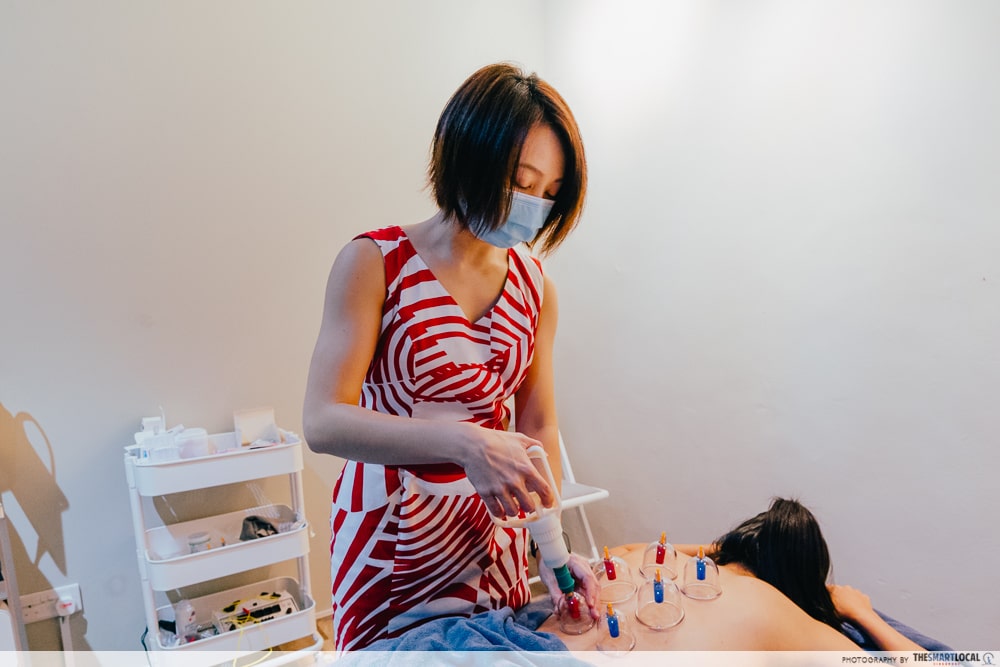 Cupping treatment to increase blood circulation.
Cupping treatment to increase blood circulation.
Another treatment to pamper your tired feet and soul is the Herb Iontophoresis. This foot soak uses an electric current to stimulate herb absorption through your skin. By doing so, it helps to boost your immunity, improve sleep and reduce fatigue. Whether you’re suffering from migraine, back pain or menstrual pain, you can customise the selection of herb to target the problem.
On top of that, other highlights at Singapore Paincare TCM Wellness include cupping, acupuncture and paediatric care.

If a slight ache in the neck or back has been bugging you for a while and none of the stretches seems to do the trick, it’s not too late to visit a specialist. Because you know, health is wealth.
Redeem a Qi’Nergy Tuina massage first trial at $68
This post was brought to you by Singapore Paincare Holdings.
Photography by Alvin Wong & Jie Ling.
